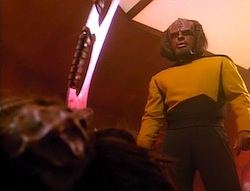“Reunion”
Written by Drew Deighan and Thomas Perry & Jo Perry and Ronald D. Moore & Brannon Braga
Directed by Jonathan Frakes
Season 4, Episode 7
Production episode 40274-181
Original air date: November 5, 1990
Stardate: 44246.3
Captain’s Log: The Enterprise is hailed by a Klingon ship that is carrying the Federation Ambassador to the Klingon Empire, K’Ehleyr. She has a matter of some urgency to discuss with the crew. Picard sends Worf to greet her—Worf points out that K’Ehleyr may be offended by his discommendation, and Picard slaps him down, saying that he can’t go into hiding every time a Klingon ship decloaks.
Upon arriving in the transporter room, Worf’s discommendation proves to be the least of the awkwardness, as the ambassador beams aboard with a young son named Alexander, who has the same forehead crest as Worf. (Worf is also surprised that there are two to beam aboard at first, though that confusion doesn’t really make sense—ambassadors often have aides, after all. But whatever.)
K’Ehleyr leaves Alexander in the Enterprise‘s day-care center and then meets with the senior staff. Two factions are vying for power within the Klingon Empire. Up until now, K’mpec has held them in check, but he’s dying. He’s on the cruiser K’Ehleyr came in, and has requested to speak to Picard alone.
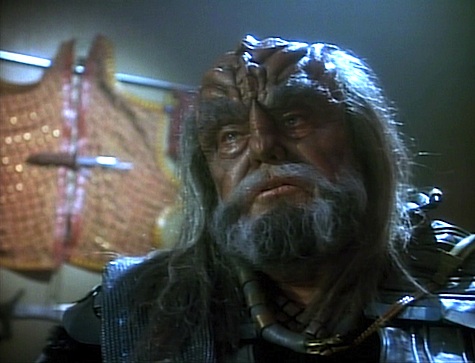
K’mpec looks much worse than he did the last time we saw him. Once he and Picard are alone, he says he needs the captain’s help. Picard offers the Enterprise‘s medical facility, but it’s too late for that: he’s been slowly poisoned by Veridium 6, which has no cure. He wants Picard to serve as Arbiter of Succession between the two factions to determine who will lead the High Council after K’mpec’s death. He can’t trust anyone on the High Council, and he has his reasons for wanting an outsider.
Picard refuses, but K’mpec has already given the order—since if he’d asked, Picard would have said no. Picard is antsy about being put in the position to choose the next leader of a major power, but K’mpec explains that as Arbiter, he must determine who are the two strongest candidates and then they fight for the honor of being chancellor. Picard is now confused: there are only two factions, so what would be the point? But K’mpec’s real reason for wanting Picard is that he wants to find out which of the two petitioners is responsible for poisoning K’mpec. A Klingon who kills without showing his face has no honor and can’t be permitted to rule.
What really gets Picard’s attention, though, is the name of one of the two candidates: Duras. The same guy who tried to have Picard killed and conspired to strip Worf of his good name.
K’mpec dies shortly thereafter. The Enterprise must now wait for Duras and the other petitioner, Gowron, to arrive. Meanwhile, Alexander doesn’t fit in with the other kids on the ship, and Worf takes him out of daycare and back to K’Ehleyr’s quarters.
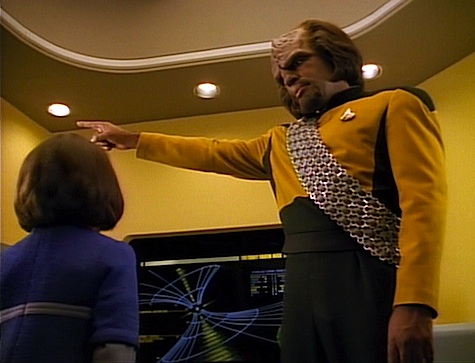
Worf and K’Ehleyr argue for a while, covering an impressive range of topics: how K’Ehleyr is raising Alexander, why Worf can’t acknowledge him (as his son, his dishonor would also affect the boy), and why Worf accepted discommendation in the first place (the true reasons are known only to Picard, Worf, Kurn, and the High Council).
Gowron and Duras show up in their own ships. Duras begins the conversation in full-on snotty mode (“Let’s get this over with, Picard”), and says that Picard shouldn’t be involved in this. Picard announces that the Sonchi ceremony will begin in one hour. Duras gets pissed, asking what the delay is, and Picard calmly states that there is no delay, it’s the time he’s chosen. After a parting shot at Worf (“Keep that petaQ away from the ceremony, Picard! He has no place on a Klingon ship!”), Duras signs off.
Picard and Worf speak in the former’s ready room. Picard shares K’mpec’s dying wishes. Worf does not believe Duras should be allowed to lead the council because his father was a traitor, but Picard can’t hold Duras responsible for his father’s crime. He can hold Duras responsible for placing the blame for Ja’rod’s actions on Mogh, but Worf accepted the consequences of that lie when he agreed to discommendation.
On K’mpec’s ship, they perform the Sonchi (the word literally means, “he is dead”). Picard, Gowron, and Duras each walk up to K’mpec’s corpse and shove a painstik into his chest in order to confirm that he’s really dead. Duras lingers for several extra seconds with his painstik, and then urges Picard to get on with it, since it’s obvious who the two challengers are. Picard wants to reconvene aboard the Enterprise, but Duras wants to finish it now.
And then a bomb goes off.
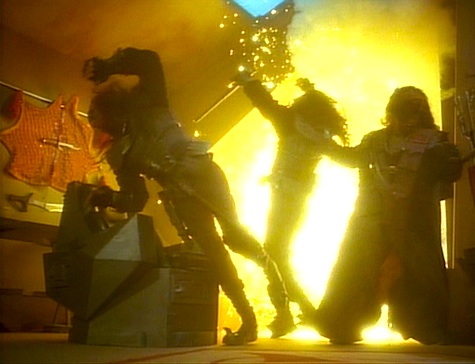
Two Klingons are killed, and several are injured. Afterward, Worf goes to K’Ehleyr’s cabin to get her report on the explosion, during which they admit that they still have strong feelings for each other—K’Ehleyr even goes so far to almost apologize for keeping Alexander from him. They come within a hairsbreadth of taking the oath, but Worf backs off. His discommendation means he can’t mate with her, nor acknowledge Alexander. K’Ehleyr is cranky about it, but accepts his wishes, asking only that, if Worf can’t be Alexander’s father, to at least be his friend.
K’Ehleyr then meets with Picard, who wants to delay the ceremony until they can finish examining the bomb debris and the bodies. While the modern rite of succession has a declaration of the two finalists, and then the fight, K’Ehleyr tells Picard about an old ceremony called the ja’chuq, during which the petitioners must recite the victories they’ve won, the honors they’ve claimed, to show their worthiness to lead the High Council.
Duras and Gowron snipe at each other, with Duras accusing Gowron of planting the bomb. They start to go at it until Picard yells “mev yap!” (“Enough!”) and tells them to sit down. Gowron deliberately turns his back, on Duras in order to return to his seat, a major insult (though his wide smile is an even bigger one). When Picard announces that the ja’chuq is next, they are incensed, as that ritual is “obsolete,” but Picard doesn’t give them a choice. (Duras looks pouty at this information, but Gowron looks thoughtful. His initial assessment of Picard is dismissive, but we start to see respect here.)
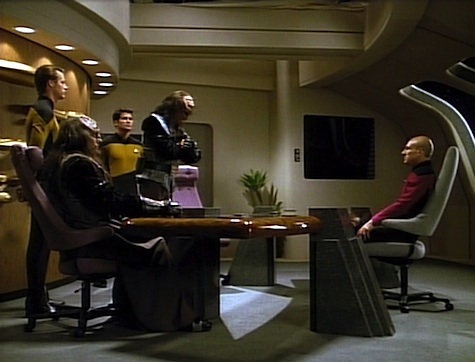
Alexander is in Worf’s quarters, looking at his bat’leth, which Worf says has been in his family for ten generations. Meanwhile, Gowron comes to speak to K’Ehleyr alone, offering her whatever she might want, up to and including a seat on the High Council (even though later episodes establish that women can’t serve on the Council), if she’ll just quicken the pace.
In one of the most jarring scenes in TNG history, Riker walks into engineering to meet with Data and La Forge. Up until now, every scene has been about the Klingons, and there’ve been a lot of dark rooms and tall cranky people with bony foreheads and wearing armor. To suddenly see these three in the brightly lit engine room is a bit of a “whoa, Nelly!” moment.
Anyhow, Data and La Forge report that the bomb was a triceron derivative—and the bomb used a molecular-decay detonator, which only Romulans use. A Romulan connection is problematic, since a new Klingon-Romulan alliance would seriously muck with the local balance of power.
K’Ehleyr tells everyone about Gowron’s visit to her, but Worf is convinced that Duras is the one working with Romulans—but neither he nor Picard are willing to provide details of their distrust. K’Ehleyr, therefore, goes back to her cabin and starts digging up information on the events of “Sins of the Father.” She hits a firewall, though, as the records of the council sessions regarding the Khitomer inquiries have been sealed—by Duras.
After Gowron finishes his part of the ja’chuq, Picard declares that there will be a recess while he reviews the claims. He also wishes to discuss the findings of the bomb investigation, and summons Worf, whose presence is disruptive (a deliberate ploy on Picard’s part to mess with Duras and Gowron’s heads). He tells them that they detected a molecular-decay detonator—something neither of the Klingons’ sensor readings turned up. Both Duras and Gowron are shocked at this.
When Duras returns to his quarters, he is told that K’Ehleyr has been looking into the Khitomer investigation, and goes to her cabin to confront her. Thanks to her access to the Enterprise logs—including La Forge and Data’s discovery that evidence was altered—she knows that something’s up and throws it in Duras’s face.
In sickbay Crusher reports to Riker that she’s figured out where the bomb was, based on the tissue damage to the two who died: it was in the forearm of one of the Klingons, specifically, one of Duras’s guys. It looks like the intent was to take out Gowron before they could fight, thus guaranteeing Duras’s ascension.
Worf brings Alexander to K’Ehleyr’s quarters, only to find her draped over an ottoman, covered in blood and lacerations. She manages to tell Worf that Duras was the one who attacked her, and puts Alexander’s hand on Worf’s hand before dying. Worf clutches K’Ehleyr’s body to him, then looks to the ceiling and screams.
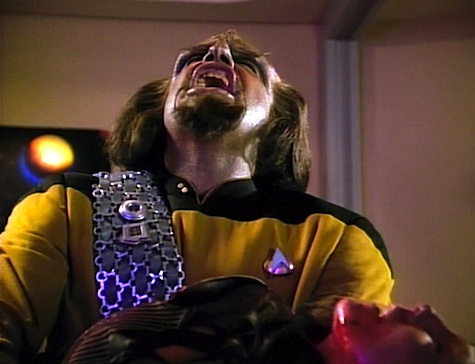
When Crusher arrives, Worf leaves Alexander with her, then goes to his quarters. He removes his baldric and combadge, grabs his bat’leth, and transports to Duras’s ship. Picard sends Riker, Data, and a security guard after him.
Worf claims the right of vengeance to Duras, who claims that as a traitor he has no rights—until Worf declares that K’Ehleyr was his mate. Apparently that outweighs discommendation, and Duras picks up a sword.
The two fight, with Duras at one point trying to convince Worf that killing him will result in Worf being a traitor forever. “Then that is how it shall be,” Worf says, and the fight continues.
Riker, Data, and the security guard come in right after Worf knocks Duras to the deck. Riker calls out Worf’s name, and every convention of television in general and Star Trek in particular leads the viewer to believe that at this point, Worf will stay his hand and possibly make a speech about how vengeance doesn’t solve anything or some other nonsense —
— but instead, Worf just guts the bastard, slamming his bat’leth into Duras’s chest.
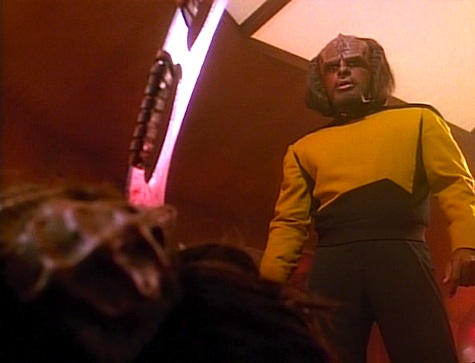
The Klingons consider the matter closed, as Worf acted properly by Klingon tradition and law. Picard doesn’t, and makes it clear that a reprimand will appear on his record for abandoning his post like that. He also expresses sympathy for his loss, and asks if now would be a good time for the truth about Khitomer to come out. Worf says it isn’t yet, as the Council participated in that coverup, too, and they won’t be quick to admit to the deception, but Worf vows that he and his brother will one day convince them to tell the truth. (Besides, they need a plot for the season finale…)
There is No Honor in Being Pummeled: One of the minor issues with “Sins of the Father” was that the actions of that episode didn’t really have much by way of day-to-day consequences, as Worf still continued to serve at tactical every week and still be grumpy and scowly and stuff. This episode, however, puts the discommendation front and center, as it has effects throughout the episode: worrying that K’Ehleyr may not wish to speak to him, poking Duras and Gowron with a stick when he shows up to report on the explosion, giving Duras yet another excuse to be an ass, and not being able to acknowledge his son. In the end, he’s still an outcast, though he does, at least, tell Alexander that he’s his father at the close of the episode.
I Believe I Said That: “Not even a bite on the cheek for old time’s sake?”
K’Ehleyr trying to get Worf to come out of his shell.
Welcome Aboard: It’s the triumphant return of three great guest actors, none of whom survive the episode: Patrick Massett, smarmy as ever as Duras; Charles Cooper, bringing tremendous gravitas to his one scene with Picard as K’mpec; and the magnificent Suzie Plakson making her encore as K’Ehleyr.
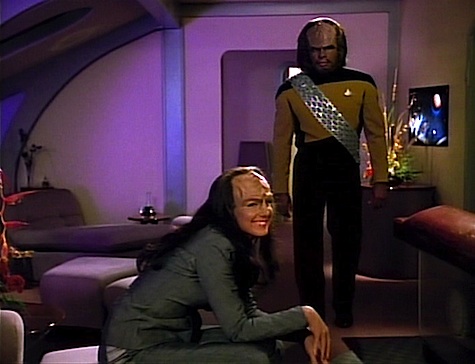
Meantime, Robert O’Reilly makes an instant impression as the wide-eyed Gowron, a role that continues throughout all of TNG and Deep Space Nine. Jon Steuer is the first of four actors to play Alexander.
Trivial Matters: A sequel to both “The Emissary” and “Sins of the Father,” this episode establishes that Klingon politics will continue to be a recurring element on the show, as indeed it continues through not just TNG, but DS9 as well.
Since “The Emissary,” K’Ehleyr got appointed Federation Ambassador to the Klingon Empire. This is significant on several levels. On DS9, Worf will eventually marry Jadzia Dax, a joined Trill whose previous host, Curzon Dax, was also once Federation Ambassador to the Empire, and at the end of DS9, Worf is appointed to that position. Back in “The Most Toys,” Worf said that he honored both Yar after she was killed in “Skin of Evil” and Data, who was believed killed in that episode, by continuing to do their duties, and I always thought it was fitting that he was made ambassador at the close of “What You Leave Behind” as a similar tribute to both K’Ehleyr and Jadzia.
K’Ehleyr will be established as being buried in Woodlawn Cemetery in New York City in your humble rewatcher’s novel Diplomatic Implausibility.
It’s unclear when, exactly, Alexander was conceived. Given how fast he grows up over the course of TNG and DS9, it’s possible that he was conceived on the holodeck in “The Emissary.” But it’s equally plausible (since his age is never stated here or in any subsequent appearance) that he was conceived when Worf and K’Ehleyr had their initial relationship. The latter is problematic, though, since Worf and K’Ehleyr’s post-coital conversation in “The Emissary” indicated that that was their first time.
This episode introduces the bat’leth, a rather nifty Klingon weapon that will be used heavily in Klingon episodes, not just on TNG, but all the subsequent spinoffs. The script originally had it as batlh’etlh, which translates to “glory blade,” but it was simplified to bat’leth in subsequent scripts, probably to make life a little easier on the poor actors. It was designed, and Worf’s moves with it choreographed, by Dan Curry, the show’s visual effects supervisor, and also a tai chi master.
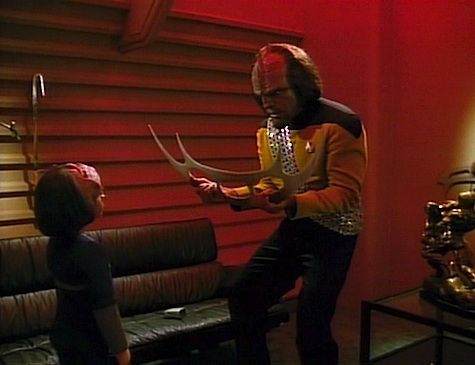
While this episode ends with Gowron as the last man standing, his ability to ascend to the chancellorship will be challenged in “Redemption” at the end of this season by Duras’s two sisters.
This is the first of two times we’ll see a change in power atop the Klingon Empire. A standing chancellor can also be challenged and killed while serving—this is seen in both “Redemption” and on DS9‘s “Tacking Into the Wind,” when Gowron is challenged both times. The ceremonies seen in this episode are obviously reserved for chancellors who die in a manner other than by challenge combat.
K’mpec’s rise to power from ship captain to councillor to chancellor is chronicled in your humble rewatcher’s novel The Art of the Impossible.
Riker makes specific reference to a “new” Klingon-Romulan alliance; the two empires were established as having some kind of alliance in “The Enterprise Incident” on the original series, and Worf mentioned in “The Neutral Zone” that the Khitomer Massacre that claimed his parents’ lives occurred when the Romulans and Klingons were allies (though La Forge also says here that the Klingons and Romulans had been “blood enemies” for 75 years, a time frame that includes Khitomer, but whatever…).
This is the second time seeing the Klingon death scream after its introduction in “Heart of Glory.” It will be seen twice more, both times involving Worf, on DS9, in “Tears of the Prophets” and “Tacking Into the Wind.”
Co-writer Thomas Perry is also the author of the Edgar Award-winning mystery novel The Butcher’s Boy, and also wrote the Jane Whitfield series of mysteries, and a variety of other novels (including Metzger’s Dog, which your humble rewatcher read in high school and really really liked).
Make it So: “Qab jIH ngil” I freely admit to bias on this episode, as Worf is one of my two favorite characters in all Trekdom (the other being Kira Nerys on DS9), and I’ve always been a huge fan of Klingons going all the way back to being wowed by Kang on the original series’ “Day of the Dove” as an impressionable youth. I’ve also gotten a lot of mileage out of the various Klingon episodes in my Trek fiction.
But even with all that, I can unreservedly say that this is one of Star Trek‘s finest hours. It’s a gripping story, both on a personal level—the return of K’Ehleyr and the revelation that she has a son by Worf—and on the grand scale, as one of the three most venerable alien races on Star Trek (along with Vulcans and Romulans) gets a change in power structure that is filled with intrigue. In only his second directorial endeavor, Jonathan Frakes establishes himself as one of the show’s best directors (indeed, he has established himself as one of the best TV directors working—he’s one of the regular helmers of Leverage these days—and this episode is a textbook example of how good he is).
And holy crap, is it all intense. It helps that you’ve got some great acting here. The whole episode would be worth it for the scene between Picard and K’mpec, as the crafty old politician manipulates Picard into fulfilling his dying wish. Suzie Plakson and Michael Dorn pick up where they left off in “The Emissary,” only this time it’s Worf who refuses to mate due to his own change in circumstances. Patrick Massett’s even snottier and whinier as Duras than he was in “Sins of the Father,” and it plays beautifully off of Robert O’Reilly sneering contempt as Gowron. (I particularly like how Duras is the one most eager to remind everyone that Worf is discommendated, especially since it’s his family’s dishonor that is being covered up by it. Just a little something to make us enjoy it more when Worf kills the twerp.)
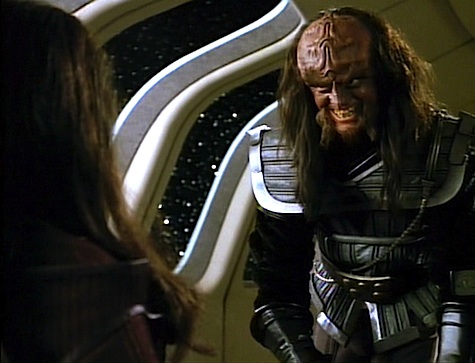
Losing K’Ehleyr is a nasty blow—this isn’t the type of guest character who dies in her second appearance, so it’s more than a little shocking to find out that she came out on the losing end of her dispute with Duras. Indeed, she is one of the finest guest stars in TNG‘s history, and it’s perhaps no greater testament to the strength of this episode that it remains great despite losing her.
It all ends with a truly epic swordfight, beautifully choreographed, and with minimal use of unconvincing stunt doubles (there are a lot of close-ups here; kudos to Dorn and Massett for selling it). And just as in “The Enemy,” the writers wisely choose not to try to superimpose human morality on an alien character. Vengeance is a right in Klingon culture, and Worf can do little else after learning that Duras killed the woman he said he would never be complete without. Plus, seriously, when he slams that bat’leth into Duras, it’s so cathartic…
Unlike “Sins of the Father,” which grafted an officer-exchange subplot to give the rest of the crew something to do, there isn’t even a pretense here. Beyond Picard and Worf, the main cast is all but absent, and you don’t really miss them. This grand political epic works just fine with the rest of the gang in a supporting-to-nonexistent role.
Warp factor rating: 10
Keith R.A. DeCandido has written a whole buncha Klingon fiction: the novels Diplomatic Implausibility, The Art of the Impossible, A Good Day to Die, Honor Bound, Enemy Territory, A Burning House, The Brave and the Bold Book 2, A Singular Destiny, and A Time for War, a Time for Peace; the novellas The Unhappy Ones (in Seven Deadly Sins)andEnterprises of Great Pitch and Moment (part of the Slings and Arrows eBook miniseries); the short stories “loDnI’pu’ vavpu’ je” (Tales from the Captain’s Table) and “Family Matters” (Mirror Universe: Shards and Shadows); and the comic book Alien Spotlight: Klingons. Go to Keith’s web site, which is a gateway to his blog, his Facebook, his Twitter, and the various podcasts he’s involved with: Dead Kitchen Radio, The Chronic Rift, and the Parsec Award-winning HG World.










